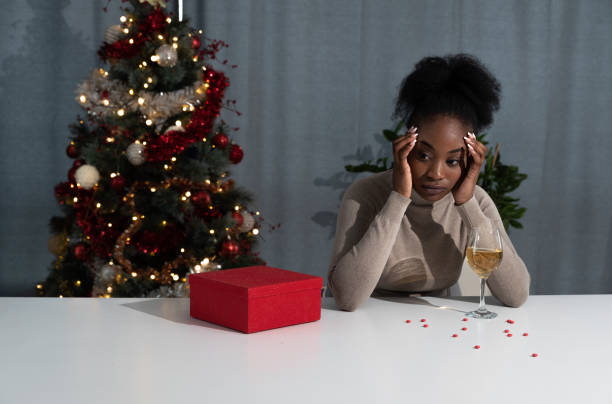
When people we love are going through depression, it’s serious. And during the holidays, this disorder can be intensified. holiday depression
“I see a surge of people feeling more depressed and anxious at this time of year,” Asha Tarry, New York-based counselor and CEO of Behavioral Health Consulting Services LMSW, PLLC says. “The levels of anxiety are higher and the cycles of depression are more common. As we experience less sunlight or reminders of loss of loved ones, finances, etc., people tend to become more depressed during the holidays, or experience more of ‘the blues.’”
Writer and motivational speaker Richard Taylor suffered from depression and suicidal behavior for 12 years. During that time, the holidays further fueled his condition.
“I always associated my value with what I could provide for family during the holidays with my success,” Taylor says. “As a college student and a young entrepreneur, I felt like a failure when I showed up empty-handed or with nothing to bring during the holidays. I could be around all the people I loved and still feel lonely because I didn't see myself worthy of being around.”
There are ways to support your loved ones, but putting them down isn’t one of them. Here is what you should and should not say to your friends and family who may be suffering from a disorder:
Don’t say: “You don’t need a therapist.”
Instead, say: “I’ve got your back. We can find the help you need.”
Advice from family and friends is great, but sometimes, people really do need a therapist. Only about a quarter of Blacks seek mental health care compared to 40 percent of whites, according to the National Alliance on Mental Health.
The last thing you should do is discourage someone from reaching out to a professional for an assessment or help — someone who is actually trained to diagnose and treat depression.
“If a friend, relative or colleague have indications of someone they know feeling depressed such as crying often, irritability, restless behavior, lack of sleep or oversleeping, significant, unexplainable weight gain or loss they should redirect them to a professional right away,” Tarry adds. “It's nice to be a good friend and listen and advise. But, in some cases, it's best to not assume you're qualified — unless you are — to handle anyone else's issues on your own. Leave it to the professionals to step in and help people get to the root of it!”
Don’t say: “It can’t be that bad.”
Instead, say: “I may not fully understand what you’re going through, but I’m here to try.”
There is a major difference in being just a little sad and having depression. It’s important not to confuse the two, according to the National Institute on Mental Health. Keep in mind that there is a number of different depressive disorders, ranging in severity and length of time.
Don’t say: “You just need to relax and pray about it.”
Instead say: “We can do whatever we need to for you to get better.”
Those you love need to know that they can confide in you without judgment and they may be already nervous to share their feelings with you. A survey by Mental Health America showed that 63 percent of Black respondents viewed depression as a “personal weakness” compared to 54 percent of the overall population.
“I hated the whole just pray about it piece,” Taylor shares. “As a believer, I felt like God would want me to do more than just pray. If faith without works is truly dead, then shouldn't I be getting help to seek out a therapist or counselor?”
MUST READ: 5 Signs A Loved One May Be Considering Suicide
Don’t say: “You’re acting crazy.”
Instead, say: “You are not going crazy. Thank you for being open.”
People who are suffering from depression are not crazy. They are simply a part of the 8 percent of U.S. adults who are suffering. But, negative attitudes toward mental illness already work as obstacles toward Blacks being open to receiving help. According to the same Mental Health America survey, 56 percent of Black Americans thought that being depressed was a “normal” part of growing older.
“The ideology that this is just a battle that only white people dealt with really got under my skin,” Taylor says. “Hearing that made me feel like I was the black sheep in the Black community. I was not only ashamed but also mad at myself for the illness I was dealing with thinking I'm the only Black person depressed.”
How to Spot Symptoms
Use the following list from Mental Health America to help determine if you or someone you care about should seek medical help immediately. MHA suggests that you talk to your doctor if you experience five or more symptoms for two weeks:
- A persistent sad, anxious or “empty” mood, or excessive crying
- Reduced appetite and weight loss or increased appetite and weight gain
- Persistent physical symptoms that do not respond to treatment, such as headaches, digestive disorders and chronic pain
- Irritability, restlessness
- Decreased energy, fatigue, feeling “slowed down”
- Feelings of guilt, worthlessness, helplessness, hopelessness, pessimism
- Sleeping too much or too little, early-morning waking
- Loss of interest or pleasure in activities, including sex
- Difficulty concentrating, remembering, or making decisions
For immediate help, contact the Suicide Prevention Lifeline at (800) 273-TALK (8255) or suicidepreventionlifeline.org.









